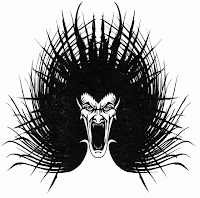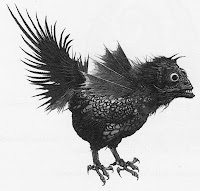 I suppose most people of European heritage are familiar with the Banshee, an Irish spirit that moans and shrieks when someone will soon die, or has just died. Considering that most of us have never heard a Banshee, its attentions must be reserved for the especially deserving or important.
I suppose most people of European heritage are familiar with the Banshee, an Irish spirit that moans and shrieks when someone will soon die, or has just died. Considering that most of us have never heard a Banshee, its attentions must be reserved for the especially deserving or important.In The Kosher Guide to Imaginary Animals: The Evil Monkey Dialogues, by Ann and Jeff Vandermeer, we also learn that the Banshee is definitely not kosher. As Ann writes, "Any 'creature' you can call 'he' or 'she' is probably not kosher." Then she goes on to ask, "But why are the evil ones always women?" to which the Evil Monkey (her husband's alter ego) replies, "Nothing I can say here will save me."
Each of the 34 items in this book takes a couple of pages: one page for a cute graphic plus a short essay on an imaginary creature, and a page for witty dialog between Ann and Evil Monkey, followed by a K, not-K, or K? ruling. Among the creatures deemed Kosher we find the Behemoth, the Leviathan, and the Ziz, touted in Jewish folklore as rulers of the land, sea and air creatures, which will be slaughtered in the age to come and fed to the righteous in a gigantic feast.
 Folklore traditions of many lands were plumbed for the subjects of the book, including Colombia for this Pollo Maligno, or Evil Chicken. While it is called "cannibalistic" in folk tradition, that doesn't mean it eats other chickens, but that it eats hunters after luring them deep into the forest. (Until recently, all chickens in American factory farms were fed dried and powdered slaughterhouse waste, making the entire poultry industry cannibalistic.) While chickens are Kosher, this one rates a K? from Ann, as the Evil Monkey dashes about chanting "POLLO MALIGNO!"
Folklore traditions of many lands were plumbed for the subjects of the book, including Colombia for this Pollo Maligno, or Evil Chicken. While it is called "cannibalistic" in folk tradition, that doesn't mean it eats other chickens, but that it eats hunters after luring them deep into the forest. (Until recently, all chickens in American factory farms were fed dried and powdered slaughterhouse waste, making the entire poultry industry cannibalistic.) While chickens are Kosher, this one rates a K? from Ann, as the Evil Monkey dashes about chanting "POLLO MALIGNO!"A number of creatures from Japanese traditions appear in these pages, including the Abumi-Guchi, an animated stirrup from a slain warrior, the Akaname, which cleans the toilet room with its tongue (though most toddlers will do that if you don't stop them), and the Jotai, or folding-screen spirit, one of a great number of spirits that arise from articles which achieve duration of a century or more. If you want "what we do here, stays here" to be true, do it among furnishings less than a century old, or the walls will gossip about you later.
 One creature seems to have arisen de novo from the authors' imagination, the Borges, a "blind magical creature" made entirely of books. The authors take sly digs at Dr. Borges in several of the essays, so I guess he is either a family friend or favorite enemy. The Borges rates a K?.
One creature seems to have arisen de novo from the authors' imagination, the Borges, a "blind magical creature" made entirely of books. The authors take sly digs at Dr. Borges in several of the essays, so I guess he is either a family friend or favorite enemy. The Borges rates a K?.Among creatures ruled Kosher we find the Greek sea-goat, which has a front half that is Kosher because goats are, and a back half with fins and scales, which also yield a Kosher ruling. In the end, whether Chupacabra, Owlman, or Dragon, nearly everything else is ruled Not Kosher. But what did we expect? Most folk traditions produce monsters and dream creatures whose hooves and cud-chewing abilities were never imagined. Even—glurk! From one word to the next, the call comes to go out and retrieve the newspaper. There go the creative juices!
I read the book at a sitting. Not only is it small enough to do that, it is such a fun read that I zipped right through it. Kosher food for the mind, and for the funny bone. The book is based on this blog post, which Ann and Jeff produced for Purim 2008. The scope of the post is larger (more animals, including not-so-imaginary ones such as the Hoopoe), but the articles are briefer. Do go and read the post also.



No comments:
Post a Comment